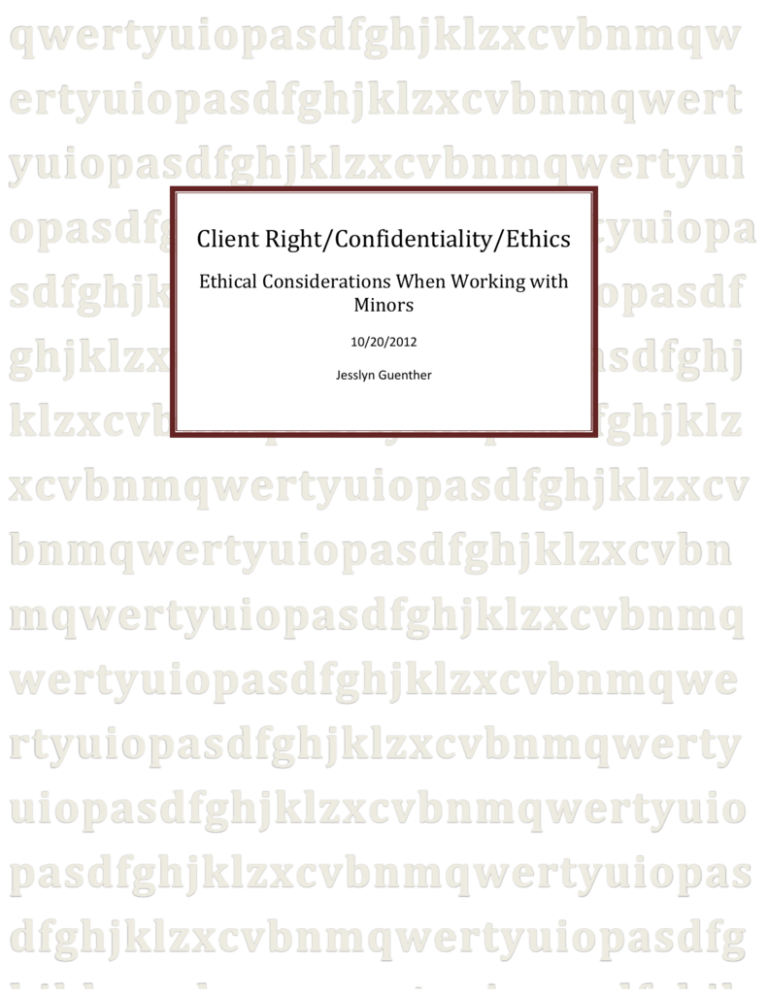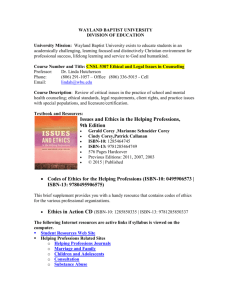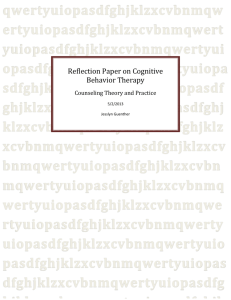Client Right/Confidentiality/Ethics
advertisement

Client Right/Confidentiality/Ethics Ethical Considerations When Working with Minors 10/20/2012 Jesslyn Guenther Jesslyn Guenther Ethical Considerations When Working With Minors Client Right/Confidentiality/Ethics 10/20/2012 Ethical Considerations When Working with Minors There are four ethical issues that consistently emerge when one considers children as clients outside the school setting. These issues are counselor competence, informed consent and minor’s ability to enter into a contractual relationship, confidentiality and child abuse reporting (Lawrence and Robinson-Kirpius, 2000). I think, as counselors, we need to be extremely careful when entering into a counseling relationship with a minor. There are more sensitive and legal issues to consider when it comes to working with minors. Competence is so important. You should make sure you have the specific skills and knowledge required when intending to counsel children. Aside from the familiarity with the disorders that are specific to and primarily found among children, examples, ADHD, Separation Anxiety Disorder and RAD, a counselor should know the theories of ego identity, moral, psychosexual and cognitive development specific to the context of serving children (Ethical Issues to Consider). All levels of counseling need to be modified when working with children to be developmentally appropriate such as, assessment, diagnosis and treatment. Because minors are a special, diverse client population, ethical practices mandate distinct Jesslyn Guenther Ethical Considerations When Working With Minors Client Right/Confidentiality/Ethics 10/20/2012 education, training and supervised practice before commencing independent practice with a minor (Lawrence and Robinson-Kirpius, 2000). I agree with this statement, just like when working with a specific race or culture of people, we should look at children in basically the same way. We, as counselors need to make sure that we are knowledgeable with the issues of children compared to adults. Informed consent is important when it comes to all clients, but typically, a minor can enter into a contractual agreement in one of three ways; with parental consent, involuntarily at a parent’s insistence or by court order (Corey, Schneider-Corey and Callanan). I believe in all three of these cases, it is best if the counselor can gain the minor’s confidence and eventually their consent so the minor feels like they are in control of who is involved in their therapy and open up to the counselor. In the best case scenario, if the counselor can get the minor to agree to involve their parents in the counseling, they can develop a three way bond. This would be healthy for both the minor and the parents. In the State of Wisconsin Statutes 51.45 (2m) 51.47, juveniles 12 years of age and older may consent to limited alcohol and other drug treatment, birth control and sexual disease treatment without the knowledge of their parents/guardians (Wisconsin Statutes). Jesslyn Guenther Ethical Considerations When Working With Minors Client Right/Confidentiality/Ethics 10/20/2012 As counselors, I think it is very important to know the laws in the state, pertaining to minors, where we seek employment. Confidentiality is of primary concern when working with minors, primarily because inconsistencies exist, where what is legally required may not coincide with what is ethically desired (Lawrence and Robinson-Kirpius). According to the American Counseling Association’s Code of Ethics and Standard of Practice, when counseling clients who are minors or individuals who are unable to give voluntary, informed consent, parents may be included in the counseling process as appropriate. Counselors act in the best interest of the client and take measures to safeguard confidentiality (B.5). I think this is a subject that can be very difficult for a counselor if the minor insists that their parents not be involved in the minor’s therapy or be given any information at all, but the counselor is bound by law to reveal information to the parents. Again, the ideal situation would be if a three way bond can be formed between the counselor, minor and parents. If child abuse is suspected, it is mandatory for the counselor to report the suspected abuse to the proper authorities. The goal of reporting is to protect the child who is being abused, because the professional has an obligation to protect those who cannot advocate for themselves (Issues and Ethics). To me, as a counselor this would be one of the most straight forward forms of breaching confidentiality because there would be no question as to whether or not to breach their confidence if I know that the minor is being abused. Jesslyn Guenther Ethical Considerations When Working With Minors Client Right/Confidentiality/Ethics 10/20/2012 In my opinion, counseling minors can be one of the most rewarding jobs and also one of the hardest. There are more ethical and legal issues to consider than when counseling adults. Although no plan of action can be completely removed from the possibility of a malpractice lawsuit, there are strategies that would allow us to minimize that risk (Community Chest Counseling). As counselors, we must be very careful as to not let the minor’s lose confidence in us or do anything to hurt their relationship with their parents. Jesslyn Guenther Ethical Considerations When Working With Minors Client Right/Confidentiality/Ethics 10/20/2012 References Wisconsin Statutes 51.45 – Prevention and Control of Alcoholism, www.lawserver.com>...>DrugsandAlcohol Issues and Ethics in the Helping Profession, Gerald Corey, Marianne Schneider Corey and Patrick Callanan, 8th Edition, 2011, Page 251 Ethical Issues to Consider When Counseling Minors / Community Chest Counseling, PSC, Victor Hugo, http://try-therapy.com/2010/08/05/ethical-issues-to-consider-whencounseling-minors/ Counseling Minors: Ethical and Legal Issues, Ledyard, Pat, Counseling and Values, April 1, 1998, www.pc3connect.org/...Counseling%20MinorsConfidential Services Available to Youth in Wisconsin, August 2008, http://www.dpi.wi.gov/sspw/confid.html Jesslyn Guenther Ethical Considerations When Working With Minors Client Right/Confidentiality/Ethics 10/20/2012






